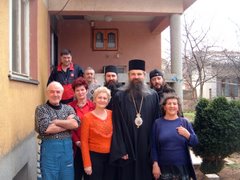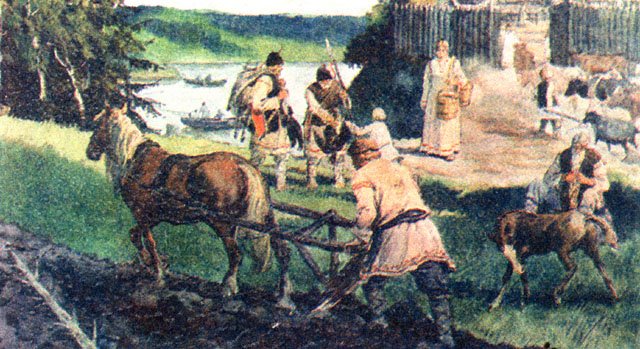The Prophecy Concerning Kostunica Begins To Manifest
5 August 2006
The Prophecy concerning Vojislav Kostunica was told during the 19th century by the Tarabic brothers from the village of Kremja.
PM to control anti-terror troops
BELGRADE, Serbia, Aug. 3 (UPI) -- Serbia will form an army anti-terrorist battalion that will be under control of the prime minister, Defense Minister Zoran Stankovic said.
While Stankovic hailed the move as improvement in putting the army under civilian control, a military expert said Prime Minister Vojislav Kostunica wants to have a grip on part of the military and thus diminish the role of the head of state as Serbia's supreme commander, Belgrade's B92 radio reported.
Following a peaceful disintegration of the Serbia-Montenegro union in May, Serbia's President Boris Tadic has been confirmed as the supreme commander of the Serbian military.
The anti-terrorist battalion, to be formed in September, will be run by Kostunica and not the Defense minister nor the head of the general staff, minister Stankovic said.
Military expert Aleksandar Radic told B92 the key rule of the military is that it has only one commander.
"It is obvious that the Serbian government wants to achieve control over the armed forces as soon as possible. Serbia still has to work out a new constitution and this is a chance for the government to diminish the role of the supreme commander until new elections are held," Radic said.
E-MAIL PRINT SAVE LICENSE© Copyright 2006 United Press International, Inc. All Rights
This is a WorldNetDaily printer-friendly version of the article which follows. To view this item online, visit http://www.worldnetdaily.com/news/article.asp?ARTICLE_ID=17674
Saturday, October 14, 2000
A NATION REBORN
Kostunica fulfills Serb prophecy?
'He would unite all the people, who would rise and chase out the Godless'
Posted: October 14, 2000 1:00 a.m. Eastern
© 2000 WorldNetDaily.com-->© 2000 WorldNetDaily.com
Editor's note: Reporter Aleksandar Pavic has been in Belgrade covering Yugoslavia's historic election and its dramatic aftermath for WorldNetDaily.com.
By Aleksandar Pavic © 2000, WorldNetDaily.com, Inc.
BELGRADE, Yugoslavia -- About a month before the Sept. 24 election day in Yugoslavia, then-presidential candidate Vojislav Kostunica visited the small Serbian village of Kremna. One of the first to greet him was Petar Tarabic, who came up to him and said, "Welcome, Mr. President, may the Lord bless you."
These words had special meaning then, because Kremna was not just an ordinary village. It had been made famous by the Tarabic brothers, who lived in the second half of the 19th century and prophesied much of what would befall Serbia in the 20th century.
They had predicted that Serbs would renounce their name, which they did by forming Yugoslavia in 1918. They predicted that a man who was not a Serb would come and rule for a long time, which corresponded to the 40-year rule of the communist leader Tito, who was not a Serb. They predicted the turmoil following Tito's death and a long war in which Serbia would not participate but would be blamed for, which corresponds to the wars in Croatia and Bosnia. After all that ended, "a man would come from the people, named after the village from which he came; he would unite all the people, who would rise and chase out the Godless," after which Serbia would become prosperous.
It happens that President Kostunica descends from the village of Kostunici, from which his grandfather took his last name. It further happens that the man who greeted him in Kremna was a direct descendant of one of the Tarabic brothers, Mitar Tarabic. Knowing all these things may make one stop wondering why all the recent events in Serbia have come with such an elemental force, why there seemed to be a guiding hand that steered events toward a preordained destiny.
Yesterday's all-powerful leader, Slobodan Milosevic, is being swept from Yugoslavia's political life with startling ease. The party that he still nominally heads, the Serbian Socialist Party (SPS), has even taken his photo off its official website. Yesterday's political allies are organizing press conferences at which they call for his replacement as the party's head.
Friday, it was the turn of Borisav Jovic, former president of Yugoslavia and former Milosevic political ally, who declared that he would return to the SPS if Milosevic left.
"Slobodan Milosevic should leave the SPS along with the top leadership and entirely new party organs should be elected," he said.
The party organization from Nis, the third-largest Serbian city, has called for Milosevic's replacement as SPS president. And the party has scheduled an early congress for Nov. 25, at which a new leadership is expected to be named.
As far as Milosevic himself is concerned, there is a consensus that he is shut up in his residence in Belgrade, still plotting to strike back.
Many think he stands behind the slowdown in the talks about the formation of a provisional Republic of Serbia government that is supposed to reflect the new political reality after the recent federal and local elections.
Indeed, Milosevic certainly still exerts personal influence on individuals dispersed throughout the country's administration, police, army and security forces. Many had tied their career fortunes to his own. Many owe their considerable wealth to the privileged economic status that he accorded them during the time of international sanctions. Some are wanted by the Hague War Crimes Tribunal.
But the feeling here is that any individual efforts at sabotaging the counterrevolution that is taking place would simply serve to help sweep away the remnants of the old system even more quickly. Strangely enough, the strong koshava wind that blew so furiously during the days preceding the fateful Oct. 5, when the federal parliament and the state television were overrun by a tidal wave of half a million people, and which afterwards slowly died down, has picked up again. Even for the most stubborn skeptics, it has become difficult to ignore the signs from above.
All this does not, of course, mean that everything is blissful, that there is no need for concern. Actually, the battle for Yugoslavia's soul has just begun, which was perhaps the basic point of the struggle against Milosevic's regime: to replace raw propaganda for something that more closely resembles real information, to face real choices and temptations, not those manufactured inside the artificial world of a hermetically closed jar. The winning DOS coalition is a heterogeneous mix of betrayed patriots, professional dissidents and New World Order mondialists -- both paid and unpaid. To the credit of all, they had the wisdom to coalesce when they realized the threat to their country and/or their own well being had become significantly greater within the country than without.
And, naturally, once the battle is over, they will slowly part company and each will assume his true role. Kostunica, the new president, is already faced with a latent challenge from inside DOS on the part of campaign manager and president of the Democratic Party, Zoran Djindjic, who many have claimed is tied to German and U.S. interests. That will be a battle worth watching, once it articulates itself, for its outcome will clearly define the future of the country.
Nevertheless, the Kremna Prophecy predicts eventual prosperity for Serbia. It also predicts another thing: namely, sometime after peace finally comes to Serbia, "there shall be a big war in which great powers over the oceans will take part; fiery balls shall fly over Serbia, but Serbia will be spared from this war."
Watching the latest events in the Middle East, one cannot help but wonder. The "shot heard around the world," fired by a Serb, Gavrilo Princip, at Archduke Franz Ferdinand in Sarajevo in 1914, brought about World War I, which really marked the end of the old world and the beginning of the new.
Is Serbia's fate to be the harbinger of conflicts that give birth to yet a new era?
Previous stories:
Yugoslavia's happy counter-revolution
Milosevic's reign teeters
Milosevic's reign to end?
Church leader congratulates Kostunica
Weathermen on strike in Yugoslavia
Victory tear gas
AleksandarPavic served as chief political adviser to the president of Republika Srpska, the Serb entity in Bosnia-Herzegovina and as an adviser to the late Prince Tomislav Karageorgevitch of Yugoslavia. Pavic is currently translating Prince Tomislav's memoirs into English.

















